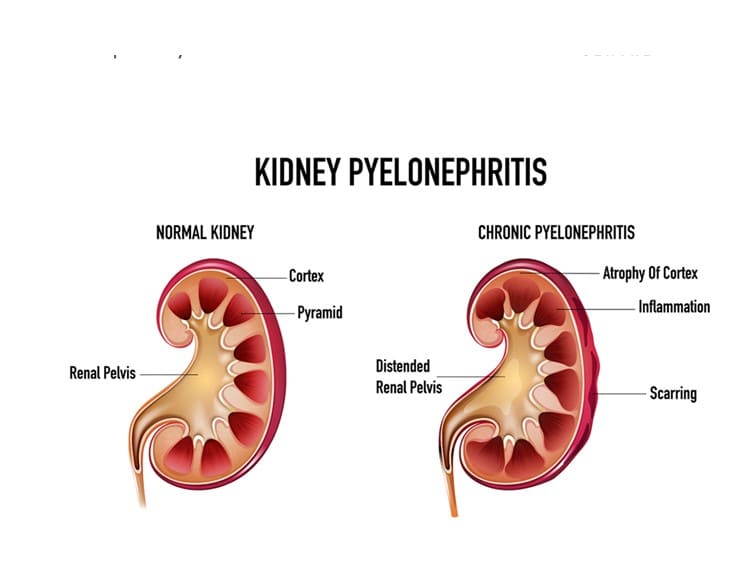Kidney infection (pyelonephritis) symptoms, causes, and treatment
Pyelonephritis (Kidney or renal infection) is a type of urinary tract infection (UTI).
Your urinary tract consists of kidneys, ureters, bladder, and urethra. If any of these parts of your urinary tract is infected, you will get a urinary tract infection. When the bacteria travel up your Ureter and infect one or both kidneys, you will get a kidney infection. Untreated urinary tract and kidney infections can cause life-threatening consequences.
Symptoms of Kidney Infection
Untreated lower urinary tract infections can lead to kidney infections. Some of the symptoms you may experience are- back pain, fever, chills or shivering, nausea or vomiting, pain in the side and groin., pain and burning sensation when urinating, pain in the lower abdomen, inability to completely empty the bladder, frequent urination, foul-smelling urine, cloudy urine or blood in the urine.
Symptoms will be similar in both men and women. However, women are more prone to kidney infections compared to men. Even pregnant women are also more likely to develop a urinary tract infection or a kidney infection.
Causes of Kidney infection
A urinary tract infection mostly occurs when bacteria enter the urethra and then multiply and infect the bladder. In some cases, a bladder infection can spread to the ureter and then to the kidneys, causing kidney infection.
The risk factors for kidney infection include diabetes, pregnancy, kidney stones, untreated lower urinary tract infection, having a urinary catheter, and a weak immune system
Kidney Infection Diagnosis
Your nephrologist examines you thoroughly and asks a few questions related to the condition you have. If the doctor suspects a kidney infection based on your symptoms and medical history, he or she will order tests like urine and blood tests and abdominal ultrasound or CT scan. A urine culture is mandatory as it helps in confirming urinary tract infection and blood tests are done to check your kidney functions. CT scan is a confirmatory test to check for stones, infection, or any blockage of the urinary tract
Kidney infection (pyelonephritis) Treatment
Based on the severity of the infection, the doctor makes a decision on whether you would need Inpatient or Outpatient treatment.
The usual course of treatment for a kidney infection is antibiotics, either in tablet form or injection form. The duration of treatment can vary from 7-14 days depending on the severity of the infection
Your doctor prescribes the antibiotics based on the urine cultures.
Bottom Line
If you have a urinary tract infection, you should see a specialist doctor and get it treated early. Don’t delay in seeking treatment even if you think that the symptoms are mild as there is a risk of causing damage to your kidneys.
In many untreated cases of kidney infection, the potential risk of kidney damage and kidney failure is very high. In addition, kidney infection has the potential to spread into the bloodstream and can be life-threatening.
DON’T NEGLECT YOUR SYMPTOMS
SEEK EARLY ADVICE AND TREATMENT
TAKE ANTIBIOTICS BASED ON URINE CULTURES AND AS PRESCRIBED BY YOUR DOCTOR

Leave a Reply